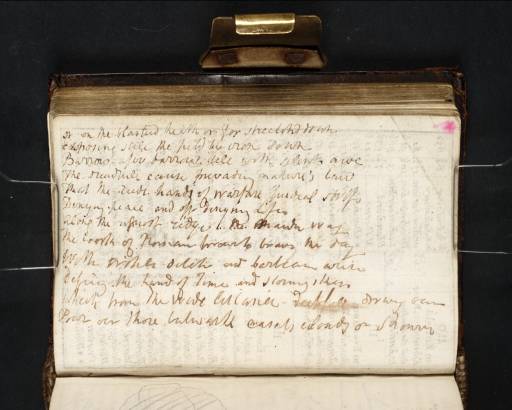Joseph Mallord William Turner Inscription by Turner: Draft of Poetry 1811
Joseph Mallord William Turner,
Inscription by Turner: Draft of Poetry
1811
Joseph Mallord William Turner 1775–1851
Folio 90 Verso:
Inscription by Turner: Draft of Poetry 1811
D08534
Turner Bequest CXXIII 87a
Turner Bequest CXXIII 87a
Inscribed by Turner in ink (see main catalogue entry) on white wove printing paper, 75 x 117 mm
Part watermark ‘W Di’
Part watermark ‘W Di’
Accepted by the nation as part of the Turner Bequest 1856
References
1862
Walter Thornbury, The Life of J.M.W. Turner, R.A. Founded on Letters and Papers Furnished by his Friends and Fellow-Academicians, London 1862, vol.II, p.25.
1897
Walter Thornbury, The Life of J.M.W. Turner, R.A. Founded on Letters and Papers Furnished by his Friends and Fellow-Academicians: A New Edition, Revised with 8 Coloured Illustrations after Turner’s Originals and 2 Woodcuts, London 1897, p.213.
1909
A.J. Finberg, A Complete Inventory of the Drawings of the Turner Bequest, London 1909, vol.I, p.348, CXXIII 87a, as ‘Verses’.
1966
Jack Lindsay, The Sunset Ship: The Poems of J.M.W. Turner, Lowestoft 1966, p.115.
1990
Andrew Wilton and Rosalind Mallord Turner, Painting and Poetry: Turner’s ‘Verse Book’ and his Work of 1804–1812, exhibition catalogue, Tate Gallery, London 1990, p.172.
The whole page is taken up with the following lines of verse:
Or on the blasted heath or far stretchd down
Exposing still the field by iron sown
Barrow after barrow tell with silent awe
The dreadfull cause prevading nature’s law
That the rude hands of warfare feudal strife
Denying peace and oft denying Life
Along the upmost ridge ..the. Maiden way
The work of Roman prowess brave the day
With triple ditch and barbican arise
Defying the hand of Time and stormy skies
Which from the wide distance <deepfull> [?driving] oer
Pour oer those bulwark cas[...] clouds or showers1
Exposing still the field by iron sown
Barrow after barrow tell with silent awe
The dreadfull cause prevading nature’s law
That the rude hands of warfare feudal strife
Denying peace and oft denying Life
Along the upmost ridge ..the. Maiden way
The work of Roman prowess brave the day
With triple ditch and barbican arise
Defying the hand of Time and stormy skies
Which from the wide distance <deepfull> [?driving] oer
Pour oer those bulwark cas[...] clouds or showers1
Interspersed with drawings and the printed pages of Coltman’s British Itinerary, sixty-nine pages of this sketchbook are given over wholly or partly to these verses which Turner intended as a commentary for publication with the Picturesque Views on the Southern Coast of England which he sketched on the 1811 West Country tour (see the introduction to the sketchbook). The first lines are on folio 18 verso (D08396), and the last on folio 207 verso (D08736; CXXIII 204a).
The previous passage, on folio 83 verso (D08520; CXXIII 80a), is the conclusion of a brief narrative on the sad fate of a West Country girl. Here Turner returns to the main topographical strand of the poem, ‘Maiden’ being Maiden Castle, the vast Iron Age hill fort south-west of Dorchester; Turner had drawn the town in the Corfe to Dartmouth sketchbook (Tate D08834; Turner Bequest CXXIV 23). The fort is just west of the main Dorchester-Weymouth road, and he presumably passed it, or perhaps even explored it, before sketching Weymouth and Portland from a point a couple of miles further south (Tate D08835; Turner Bequest CXXIV 24). However, he was incorrect in assuming any Roman involvement in the construction of the earthworks, which were abandoned by the end of the first century AD after the Romans’ defeat of the local tribes.2
Previous transcriptions have given the word in line eight as ‘Norman’ rather than ‘Roman’ but the first letter appears to be a wayward ‘R’ and the next lines, on folio 93 verso (D08540; CXXIII 90a), are a digression on Roman history, before Maiden Castle is again considered on folio 98 verso (D08550; CXXIII 95a).
The partly illegible word in the last line may be intended as ‘cas[t]les’, as Wilton and Turner suggest, or perhaps ‘casts’. The word ‘deepfull’ on the previous line is smudged, probably to delete it.
Matthew Imms
June 2011
See transcriptions (followed here with slight variations) in Lindsay 1966, p.115, all but the last two lines as part of ‘The Lost Girl’, section (l) of poem no.50, ‘On the Western Itinerary 1811’, and Wilton and Turner 1990, p.172; previously transcribed with variations in Thornbury 1862, II, p.25 and 1897, p.213.
How to cite
Matthew Imms, ‘Inscription by Turner: Draft of Poetry 1811 by Joseph Mallord William Turner’, catalogue entry, June 2011, in David Blayney Brown (ed.), J.M.W. Turner: Sketchbooks, Drawings and Watercolours, Tate Research Publication, December 2012, https://www

